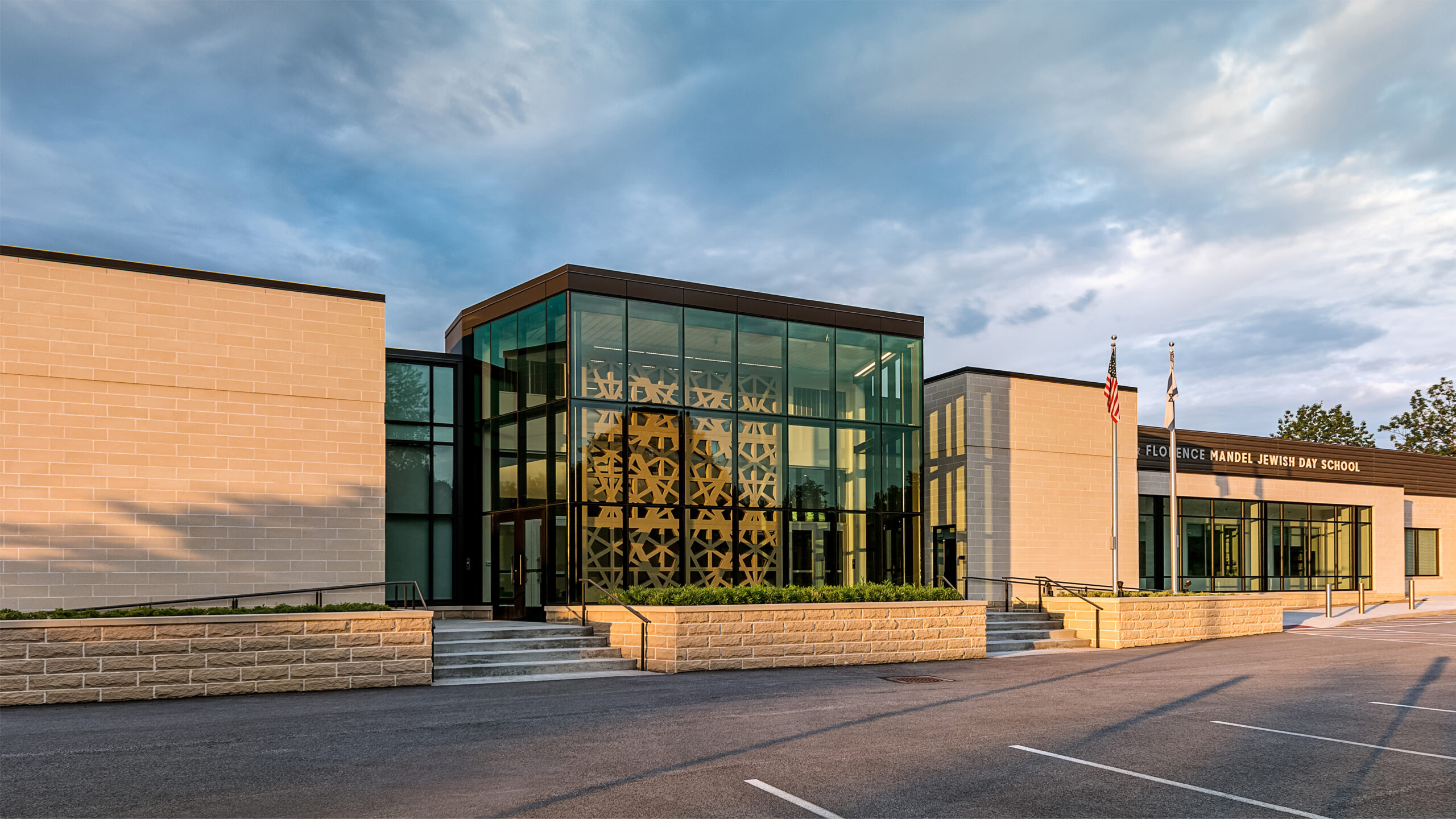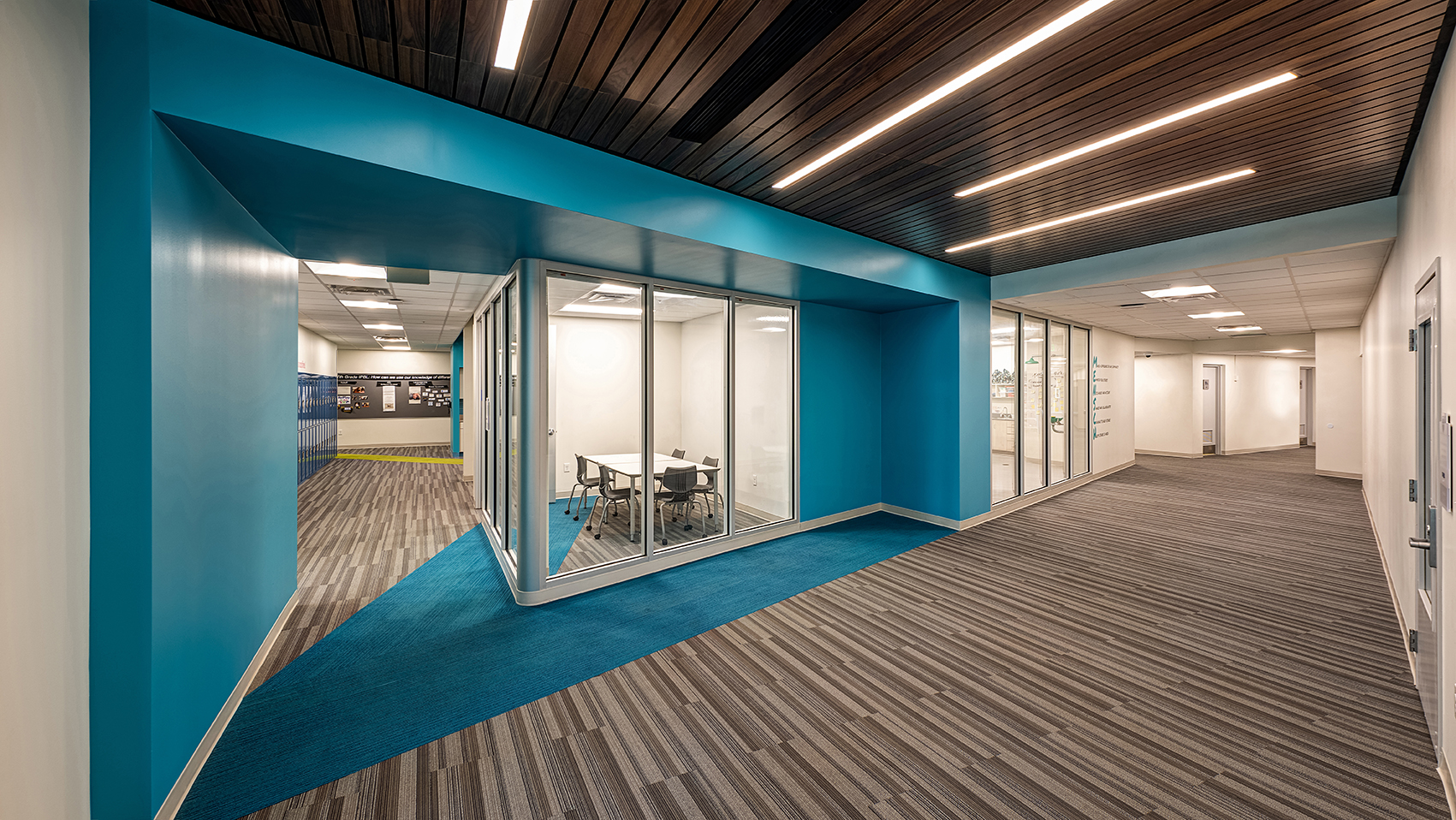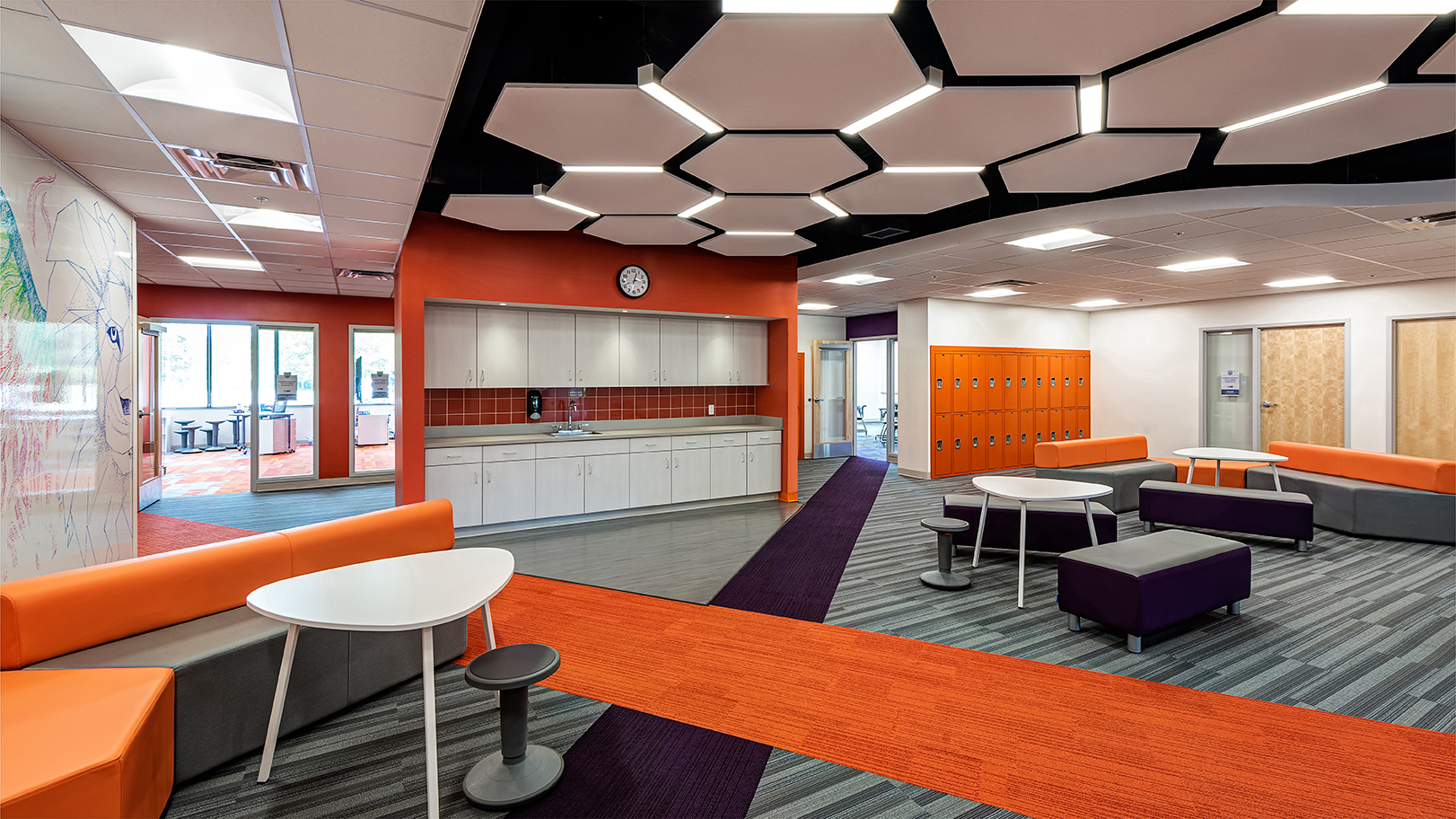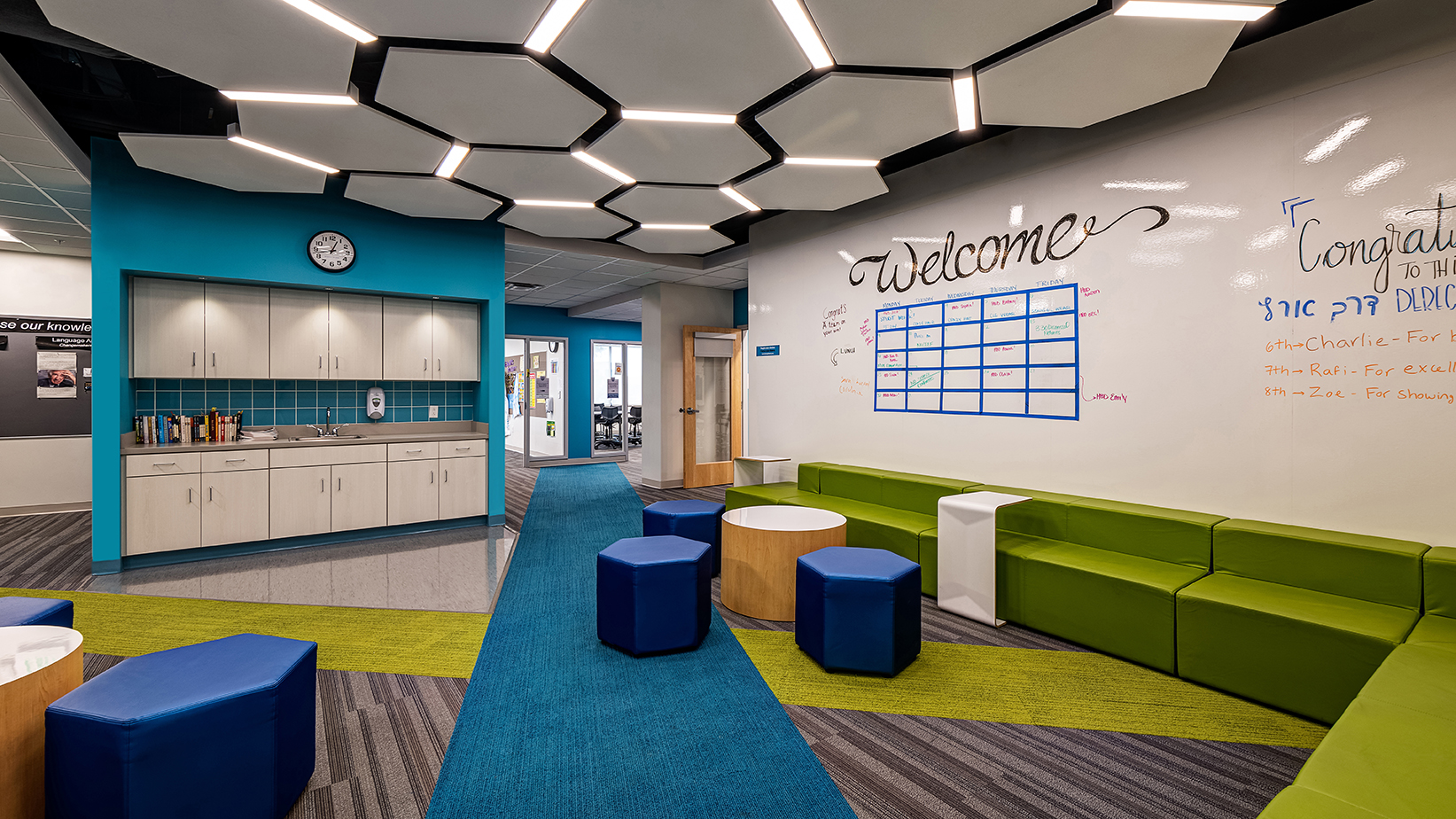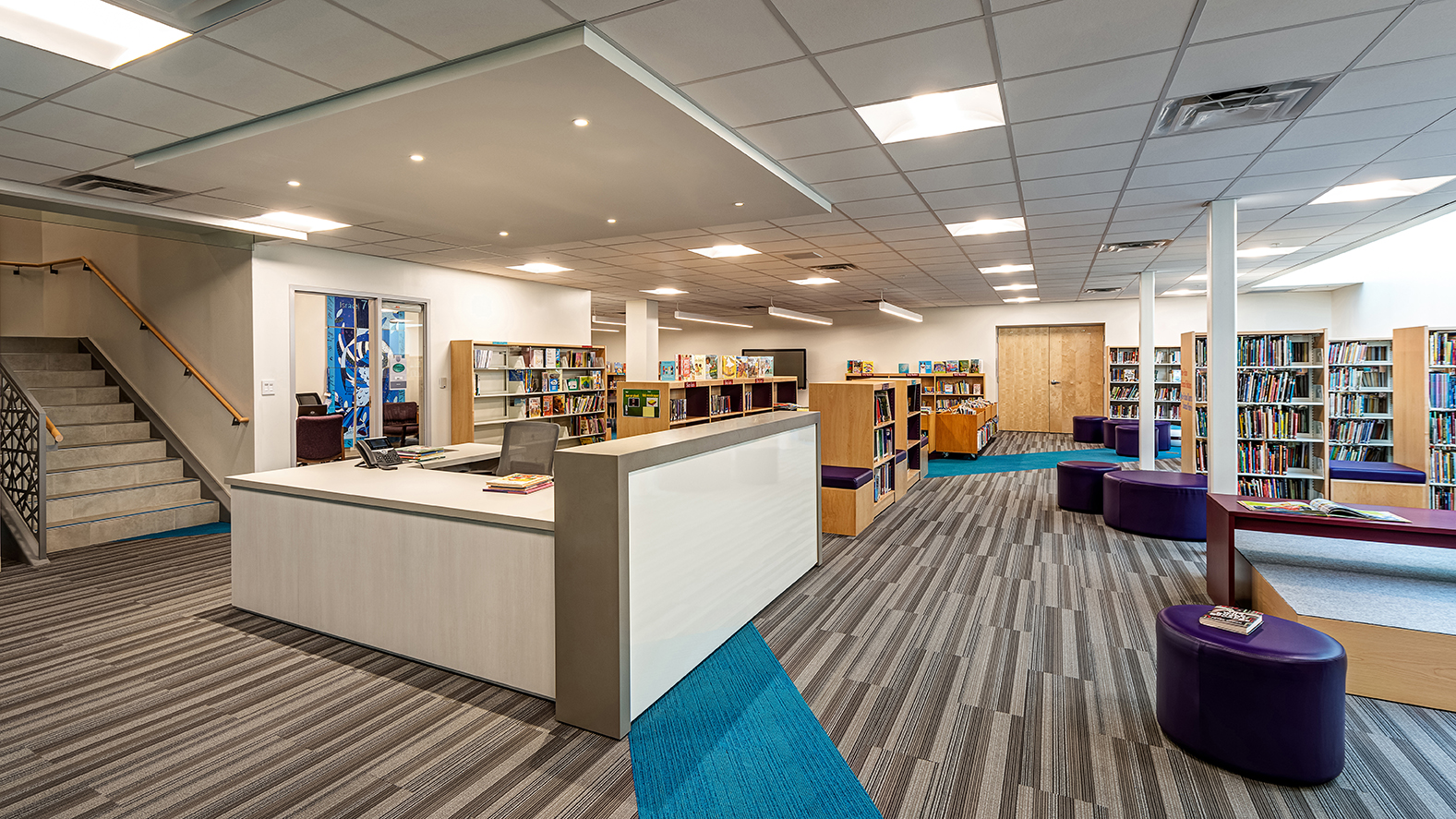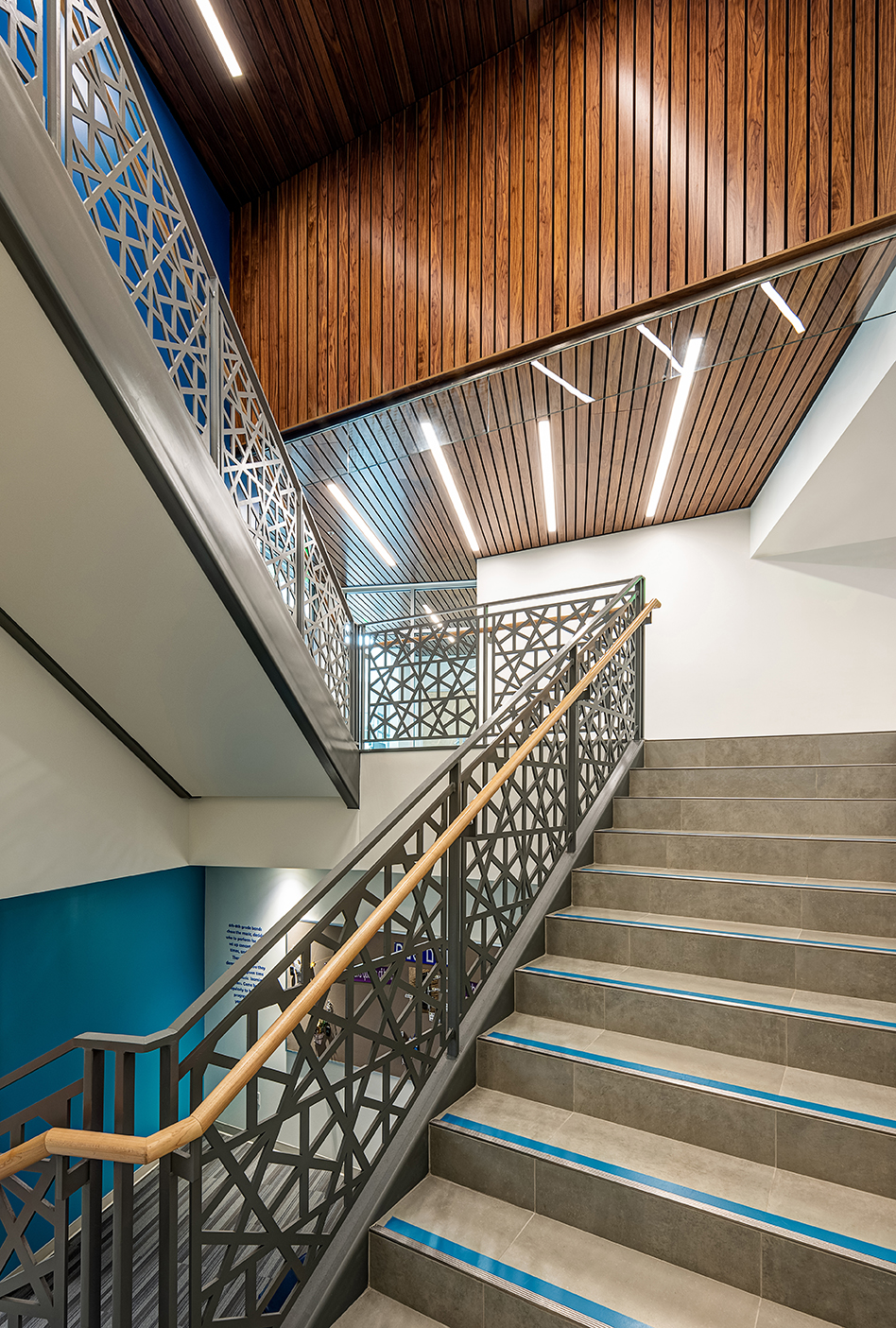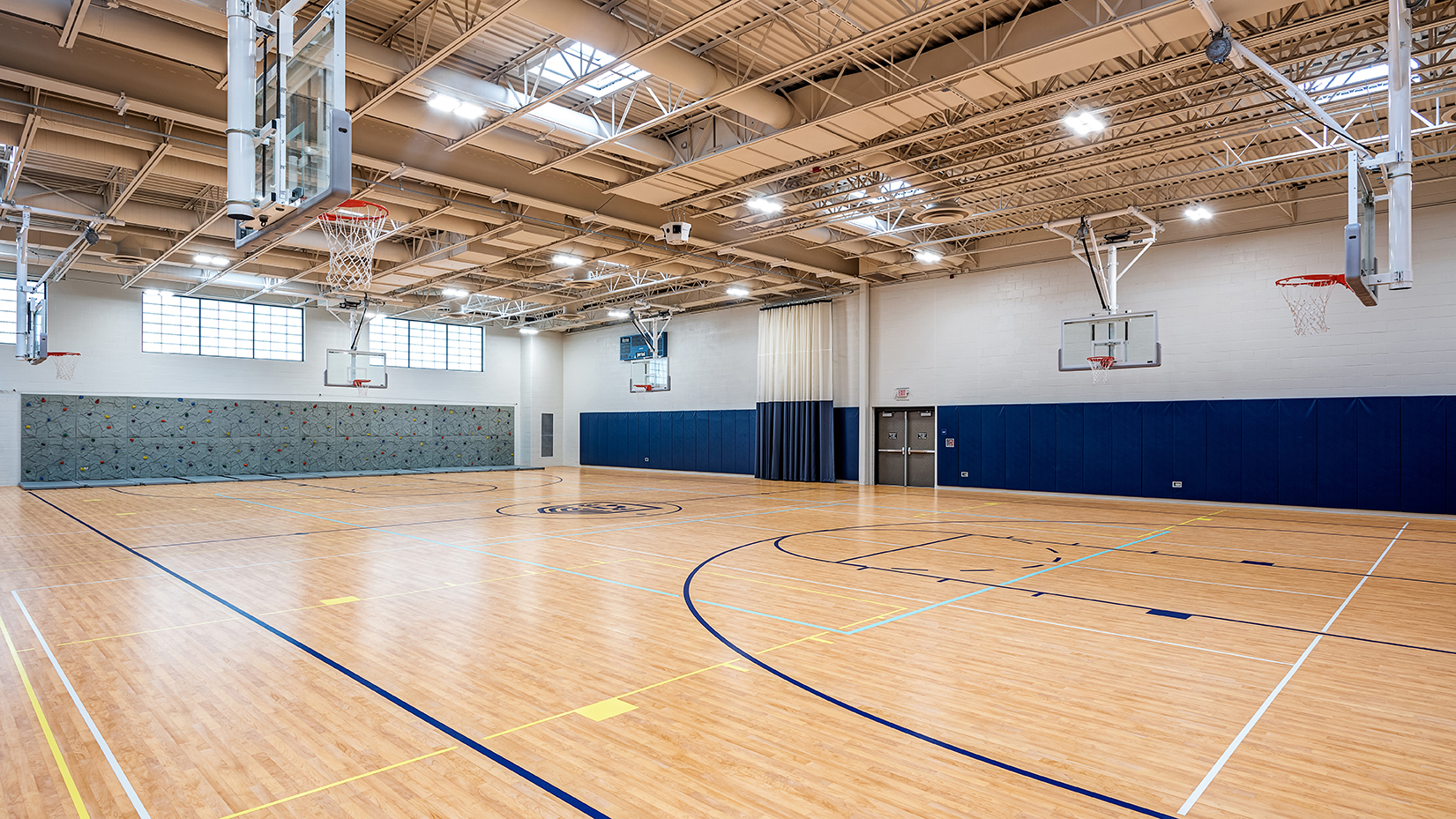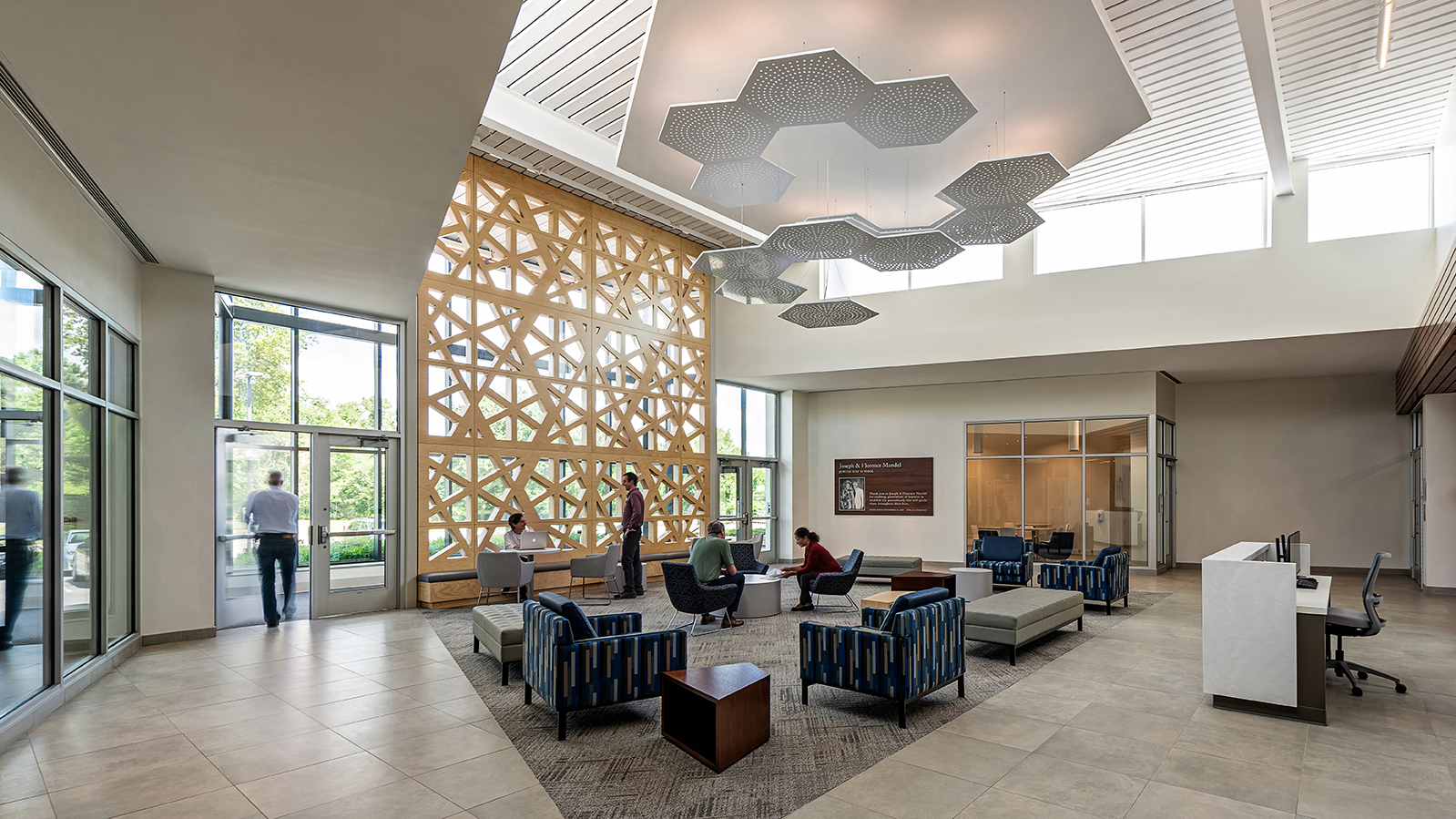EDUCATION
Mandel Jewish
Day School
Quietly tucked within a multi-institutional Jewish community campus, Mandel Jewish Day School aspired to inhabit a building as innovative and inspiring as what the students are learning. —Always By Design
Quietly tucked within a multi-institutional Jewish community campus, Mandel Jewish Day School aspired to inhabit a building as innovative and inspiring as what the students are learning.
—Always By Design
While the building’s history has always been that of an academic facility, modifications from multiple additions and renovations as well as overlapping operations as The Agnon School and Siegal College of Jewish Studies created a convoluted floor plan over its 50 years. This renovation sought to modernize the building for one entity, the Joseph and Florence Mandel Jewish Day School.
Previously characterized by an expressionless exterior and multiple entrances, the school now has a single two-story entry that creates a light-flooded lobby, known as the “community living room”. Created on-axis, the space acts as a visual and social anchor— characterized by a soaring wood monolith, abstractly patterned after the Star of David. Before the renovation, parents wandered administration offices or stood in odd corners waiting to pick up their children. Adjacent to the lobby is a comfortable Parent Lounge. Designed with safety in mind, the lobby also heightens security to modern school standards.
The Tappan is a new, 95-unit apartment building located in the Scranton Corridor of Cleveland’s Tremont neighborhood. The building sits directly across from the Historic Wagner Awning Building, a former textile factory recently converted to mixed-use apartments.
In contrast to Wagner’s soft gray field color, The Tappan’s dark, iron spot skin acts as its foil, and references the grittier, semi-industrial section of the neighborhood. Cool-toned masonry and stainless-steel trim peel away to reveal warm wood finishes that evoke an intimate, residential sanctuary.
While the building’s history has always been that of an academic facility, modifications from multiple additions and renovations as well as overlapping operations as The Agnon School and Siegal College of Jewish Studies created a convoluted floor plan over its 50 years. This renovation sought to modernize the building for one entity, the Joseph and Florence Mandel Jewish Day School.
Previously characterized by an expressionless exterior and multiple entrances, the school now has a single two-story entry that creates a light-flooded lobby, known as the “community living room”. Created on-axis, the space acts as a visual and social anchor— characterized by a soaring wood monolith, abstractly patterned after the Star of David. Before the renovation, parents wandered administration offices or stood in odd corners waiting to pick up their children. Adjacent to the lobby is a comfortable Parent Lounge. Designed with safety in mind, the lobby also heightens security to modern school standards.
While the building’s history has always been that of an academic facility, modifications from multiple additions and renovations as well as overlapping operations as The Agnon School and Siegal College of Jewish Studies created a convoluted floor plan over its 50 years. This renovation sought to modernize the building for one entity, the Joseph and Florence Mandel Jewish Day School.
Previously characterized by an expressionless exterior and multiple entrances, the school now has a single two-story entry that creates a light-flooded lobby, known as the “community living room”. Created on-axis, the space acts as a visual and social anchor— characterized by a soaring wood monolith, abstractly patterned after the Star of David. Before the renovation, parents wandered administration offices or stood in odd corners waiting to pick up their children. Adjacent to the lobby is a comfortable Parent Lounge. Designed with safety in mind, the lobby also heightens security to modern school standards.
Previously underlit classrooms are now bright, welcoming spaces strategically designed with colored entry portals. Colors are carried through the corresponding division’s wing through geometric flooring and furniture. Interior glass walls allow art and science labs to proudly be “on display” to those passing through the hallway. Classrooms were located at the perimeter to maximize daylight. Monitors, flexible furniture, and increased breakout spaces promote new styles of learning in (and around) the classroom. The gymnasium, previously ill-sized for sporting events, is expanded as a true full-size gym with skylights and a rock-climbing wall. Outfitted with movable curtains and bleachers, the gymnasium is a flexible space that can cater to home games, events, pep rallies, gatherings, and overflow learning / testing space.
The Tappan is a new, 95-unit apartment building located in the Scranton Corridor of Cleveland’s Tremont neighborhood. The building sits directly across from the Historic Wagner Awning Building, a former textile factory recently converted to mixed-use apartments.
In contrast to Wagner’s soft gray field color, The Tappan’s dark, iron spot skin acts as its foil, and references the grittier, semi-industrial section of the neighborhood. Cool-toned masonry and stainless-steel trim peel away to reveal warm wood finishes that evoke an intimate, residential sanctuary.
Previously underlit classrooms are now bright, welcoming spaces strategically designed with colored entry portals. Colors are carried through the corresponding division’s wing through geometric flooring and furniture. Interior glass walls allow art and science labs to proudly be “on display” to those passing through the hallway. Classrooms were located at the perimeter to maximize daylight. Monitors, flexible furniture, and increased breakout spaces promote new styles of learning in (and around) the classroom. The gymnasium, previously ill-sized for sporting events, is expanded as a true full-size gym with skylights and a rock-climbing wall. Outfitted with movable curtains and bleachers, the gymnasium is a flexible space that can cater to home games, events, pep rallies, gatherings, and overflow learning / testing space.
Previously underlit classrooms are now bright, welcoming spaces strategically designed with colored entry portals. Colors are carried through the corresponding division’s wing through geometric flooring and furniture. Interior glass walls allow art and science labs to proudly be “on display” to those passing through the hallway. Classrooms were located at the perimeter to maximize daylight. Monitors, flexible furniture, and increased breakout spaces promote new styles of learning in (and around) the classroom. The gymnasium, previously ill-sized for sporting events, is expanded as a true full-size gym with skylights and a rock-climbing wall. Outfitted with movable curtains and bleachers, the gymnasium is a flexible space that can cater to home games, events, pep rallies, gatherings, and overflow learning / testing space.
A tired, underused basement is repurposed as the school’s central library. Despite its underground location, the library is daylit by its cut-back ceiling that allows light from the front facade to pour down. With a palette of neutrals and the school’s signature blue, the library supports a calming, comfortable environment for study, reading, and learning.
The Tappan is a new, 95-unit apartment building located in the Scranton Corridor of Cleveland’s Tremont neighborhood. The building sits directly across from the Historic Wagner Awning Building, a former textile factory recently converted to mixed-use apartments.
In contrast to Wagner’s soft gray field color, The Tappan’s dark, iron spot skin acts as its foil, and references the grittier, semi-industrial section of the neighborhood. Cool-toned masonry and stainless-steel trim peel away to reveal warm wood finishes that evoke an intimate, residential sanctuary.
A tired, underused basement is repurposed as the school’s central library. Despite its underground location, the library is daylit by its cut-back ceiling that allows light from the front facade to pour down. With a palette of neutrals and the school’s signature blue, the library supports a calming, comfortable environment for study, reading, and learning.
A tired, underused basement is repurposed as the school’s central library. Despite its underground location, the library is daylit by its cut-back ceiling that allows light from the front facade to pour down. With a palette of neutrals and the school’s signature blue, the library supports a calming, comfortable environment for study, reading, and learning.
CLIENT
Mandel Jewish Day School
LOCATION
Beachwood, OH
SIZE
70,000 SF
SERVICES
Architecture
Master Planning
MEP Engineering
Interior Design
Related Work

